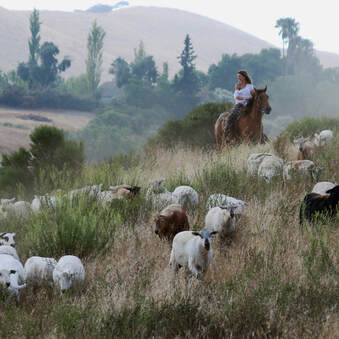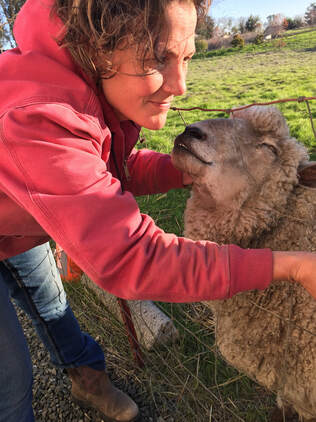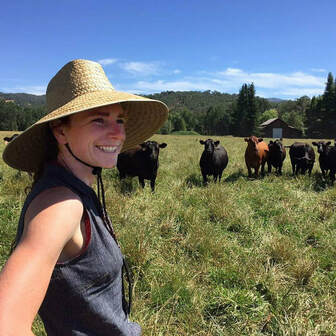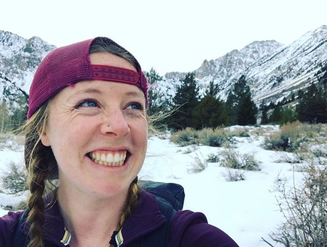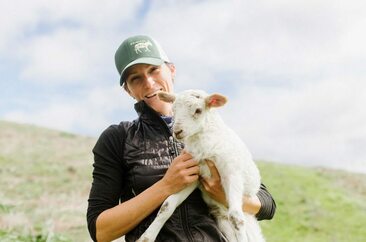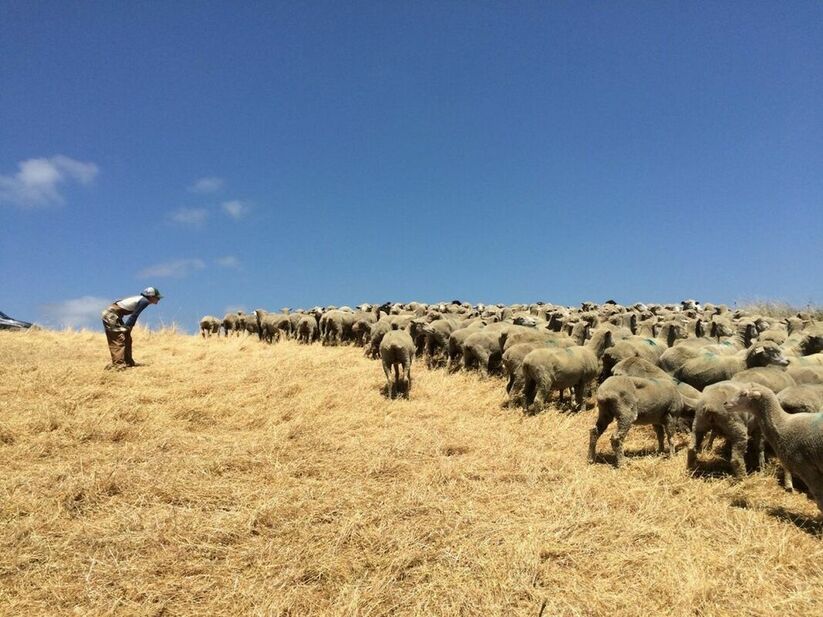Panelists
JESS Meyers
Jess currently work at Paicines Ranch located just outside of Hollister, California. The ranch consists of 7000 acres of rangeland, 550 acres of cropland and 25 acres of vineyard, all managed using Allan Savory's holistic management framework. Jess is involved in everything from collecting data on forage and soil health to planning and installing infrastructure, but her primary responsibility is managing the ranch's flock of Katahdin sheep. After her internship at Deck Family Farm in 2015, she accepted a position at a milk processing plant close to where she grew up in Ohio. It ended up being a desk job and confirmed her suspicion that she’s happiest out in the fields with the plants and the animals. She moved back to Oregon and worked odd jobs at a plant nursery, vineyard tasting room and in a permaculture garden while partnering with a neighboring vegetable farmer to raise 200 broiler chickens of my own. Doing this she realized that she wanted to do more with agriculture than work on a small scale as a business. She wanted to work on regenerating larger tracts of more vulnerable and brittle land than in the Willamette Valley. She started searching for ranches and eventually found work at Paicines Ranch.
Sarah Keiser
Sarah is a school site coordinator for at risk youth with Mentor ME and a grazing advocate in Penngrove, CA. She started the Penngrove Grazing Project, a community-based, sustainable, land-management concept working to improve the health and aesthetics of the land while increasing atmospheric carbon sequestration into the soil. At the same time creating and enhancing community in a very personal manner. She is practicing carbon farming practices by moving her flock in out of the fields in a rotational manner. Sarah grazes animals to encourage deep root growth and build top soil. Through managed grazing she encourages the plants to draw CO2 out of the atmosphere and into the soil where it becomes a beneficial nutrient. She is working to bring her sheep into the unused, mowed and unmowed pastures in Penngrove in an effort to improve the soil, produce fine wool and support a cleaner and healthier environment and bring the community together around healthy soil.
Ruthie King
Ruthie lives at Ridgewood Ranch in Mendocino County where she grazes sheep, pigs, and poultry with the New Agrarian Collective. For five years she has worked to found the School of Adaptive Agriculture, a residential training program for adults seeking to enter the field of regenerative agriculture. Her passion for stewarding the land and supporting the community that surrounds her takes many forms, including participation in the Volunteer Fire Department, Farmers Guild, Little Lake Grange, Young Agrarian Club, Good Farm Fund, and Mendocino Renegade Certification. Most recently, Ruthie started a sheep shearing business, offering low stress shearing services around the region, and giving her the opportunity to explore the beautiful grasslands, flocks, and barns of Northern California.
Suzie winquist
Suzie is a Partner Biologist for the Rangeland Watershed Initiative. She furthers the collaboration between Point Blue and the USDA’s Natural Resource Conservation Service (NRCS) in Sonoma and Marin counties. Working side-by-side with NRCS staff she builds relationships with private landowners to provide technical and financial assistance under NRCS Farm Bill habitat incentive programs with the goal of improving wildlife conservation, watershed health, and habitat quality on rangelands in these two counties.
Suzie was raised in the forested coastal hills of west Sonoma County. In 2008, she transferred to Warren Wilson College where she earned a B.S. in Biology and Environmental Studies. As a work college, Warren Wilson allowed her to study biological systems in the classroom and as part of her work for the Native Plant Crew on and around the college campus and farm. It was on the college’s farm that she was first exposed to experimental grazing practices and the implications that farm management decisions have on wildlife habitat and soil health.
Suzie was raised in the forested coastal hills of west Sonoma County. In 2008, she transferred to Warren Wilson College where she earned a B.S. in Biology and Environmental Studies. As a work college, Warren Wilson allowed her to study biological systems in the classroom and as part of her work for the Native Plant Crew on and around the college campus and farm. It was on the college’s farm that she was first exposed to experimental grazing practices and the implications that farm management decisions have on wildlife habitat and soil health.
Moderator
Paigelynn Trotter
I am a Northern California Grazer, Farmer and Shepherd working with others to reconnect ourselves and other animals to each other, the land and our food system.
We are not separate from nature; we are very much a part of it. By choosing to reclaim my role within the landscape my life has become rich with experience and satisfaction.
This is a joy to share about the discovery of a better life through writing and conversation; An honor to learn about the ways other humans have connected and found hope in the world around them; And to find creative ways to collaborate with other life makes me feel sure that to be wealthy is not a matter of money at all.
We are not separate from nature; we are very much a part of it. By choosing to reclaim my role within the landscape my life has become rich with experience and satisfaction.
This is a joy to share about the discovery of a better life through writing and conversation; An honor to learn about the ways other humans have connected and found hope in the world around them; And to find creative ways to collaborate with other life makes me feel sure that to be wealthy is not a matter of money at all.
